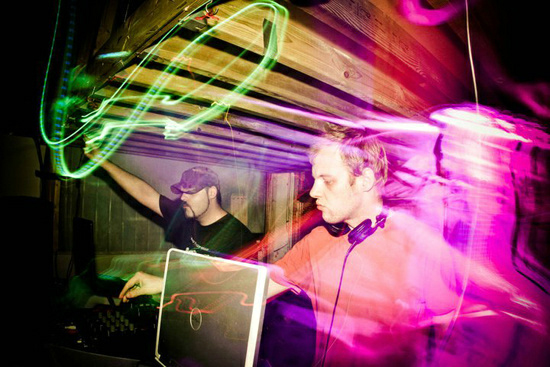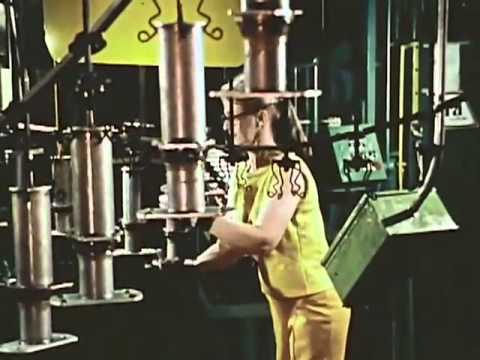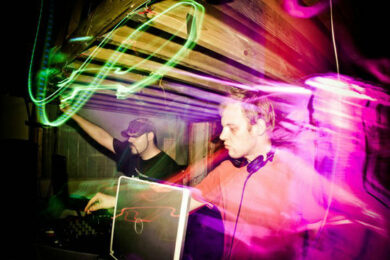LO! They advance, the massed hordes of the Perc Trax army. From the dank cellars and bunkers of Stoke On Trent, the cannonading thunder of Dead Sound & Videohead. From Seven Sisters, the ancilliary blast of Factory Floor, and Bristol, the hums of the ancient war machine, Ekoplekz. The veterans too, from Sheffield Richard H Kirk, from Norfolk Chris Carter. And General Perc himself, the white heat kicks and snares of his new brutalism rampaging down the A10 from Royston via Haringey. And now, the addition of a two-pronged assault from the North: Forward Strategy Group’s Al Matthews and Patrick Walker.
FSG’s new album Labour Division is yet another wonderful release from what must be counted as one of the finest small labels in the United Kingdom, praised by the Quietus’ Harry Sword thus: "a serious racket imbued with poise and balance, undoubtedly aimed at serious techno folk – elemental beats for discerning lifers – there is enough chilly industrial atmosphere, decadent night funk and mutant swing on display to see that Labour Division will escape the dank, airless basement it must have surely have sprung from."
Along with their labelmates, Matthews (Glasgow-born, now Leeds resident) and Walker (Edinburgh-based audio technician and community arts worker) deal in grease-on-metal sonics and lungs-in-a-mincer percussion that has at its heart something very human. Much of the music that was directly inspired by the industrial pioneers entirely misses the point, reaching toward unpleasant cliches of nihilism and pointless, decadent noise. Forward Strategy Group and the other Perc artists, on the other hand, are not necessarily directly influenced by those artists, but instead inherit a philosophy of liberation through extremes of sound and rhythm. This metallic techno grinds away with a distinct purpose: to harness our feet to power a dancefloor. Come, then, and march with them… after heeding this recruiting document:
When did you first begin to collaborate?
Al Matthews: Probably about 2005/6, we kind of bumped into each other on Myspace, Patrick was running a label called Avionix. Within a day or so, I produced my first Smear EP for his label.
What was the nature of your first work together?
AM: Remixing each other on Patrick’s label at first. I wrote what turned out to be FSG 001 in about 2006 I think, Patrick and a few others remixed it. I turned down a few offers to release it, I thought it was worth hanging onto… I was at college and my second year’s bursary was much bigger than I expected, and suddenly had exactly enough money to get a record pressed. I had no intention of ever collaborating with anyone, but Patrick did a net release called ‘Indigo’ which was really unique and I thought ‘Wow, I wish I knew how to do that’. We spent about nine months jamming, swapping ideas and stuff, before we started work on a track. We had a rough basis to play live before we had any material.
Patrick Walker: We had a couple of key moments, both doing remixes of each other. One that Al did of one of my tracks sounded a bit like that ‘Reality or Nothing’ track Regis and Female put together, whereas the one I did had was a lot harder and more linear. I think those were the moments we realised that working with each other could be interesting and productive.
Did you both grow up on electronic music? What were your first musical passions?
AM: When I was 10 this tape appeared in my bedroom out of nowhere, no idea who it belonged to, who mixed it or anything. I found out later that it was all Belgian/Dutch early 90s hardcore techno, stuff like Defcon, 80 Aum etc. I listened to anything that sounded vaguely similar for a while, until I stumbled on DJ Freak, Liza n Eliaz, really furious stuff, insanely fast and noisy but with little of the cartoonish and quite cheesy sampling that normally characterises that music. It was a huge thrill for me to hear music like this existed. It took me a very long time to get into ‘real’ music!
PW: Music was never my main passion as a youngster; I was more into drawing & painting. It wound me up a bit as a kid but eventually I came to really love Jeff Wayne’s War of the Worlds, the way it brings the story to life is very visceral. My tastes have always been quite eclectic so it’s always been hard to say exactly what I’ve liked consistently. Really memorable records for me are Primal Scream’s Screamadeclica, anything by the Orb or Sun Electric, Emanuel Top’s Asteroid, Nowhere by Ride and a lot of stuff by
Chapterhouse. The first records I remember going out of my way to get 12"s of were the Charlatans’ ‘Over Rising’ and ‘Hardcore Uproar’ by Together.
What do you feel like you each bring to FSG? Do you have differing approaches and ideas for it, or are your visions for what it should sound like quite similar?
AM: It varies, sometimes one of us will start and finish a track with pretty much no input from the other, sometimes it’s 50/50, sometimes one will have an idea of how best to mix down the other’s track. Recently Patrick has started tracks and I’ve finished them, and I consult him along the way. That seems to work very well. What one of us sees as the fun part of making music, the other sees as the laborious drudgery of it. In that sense we fit together perfectly.
PW: I use a lot more hardware, particularly over the past few years I’ve really got inside the mind of a few key machines and how to get the best sound out of them. Because I invest a lot of time sometimes in making just one sound I can get quite fixated with certain textures or sounds. I love hypnotic soundscapes that don’t do very much where Al is a bit more hyperactive. He’s a lot bolder with introducing sounds and how he manipulates them.
How has your music developed over the time that you’ve been producing as Forward Strategy Group? Has Labour Division allowed you the space to do anything drastically different, or realise ideas you’d had previously that wouldn’t have worked on a 12"?
PW: We’ve learned to do more with less and give each sound a lot more solidity. The album sounds really visceral in places and I’m really pleased about that, so I guess something we’ve been able to push the boat out on has been sound-design. Another thing about working in album format is that we’ve both contributed a lot more melodic content, most of our EP’s have been a bit atonal so it feels like that’s brought a new kind of substance to what we’re doing.
AM: The album allowed us to present ourselves differently, but we didn’t actually do anything different, we have unreleased material that occupies similar ground but we didn’t feel were suited to an EP. Two tracks were three years old, parts of some tracks were six or seven years old. There’s also one track that didn’t quite make it which I actually started 10 years ago, long before I got interested in techno. It’s potentially a monster, we always perform it in some form in live sets, but we haven’t quite been able to do it justice for a release. So it was good to work on something bigger, we’d developed a lot of good half-ideas over the years, and it was the ideal platform to show them off.
Why Labour Division?
AM: It was laziness at first, then it became apparent that Labour Division was the big club-friendly track, the ‘hit single’. I liked the idea of naming it that way, the logic of pop albums throughout the ages.
PW: There’s a number of reasons, but for me because it felt like quite an iconic title. We did have passing discussion about imagery we wanted to associate with the album and themes which emerged were; political humour, dada-ist abstraction, Russian constructivist artwork,
Smiths-era pop music, gothic and dystopian imagery. All sorts of things came out of that, but Labour Division managed to coin everything quite neatly.
I thought opening with ‘Ident’ lent it a uniquely British atmosphere, a bit like Perc’s use of the Thames TV ident in one of his mixes. Was that deliberate? Were you interested in projecting a very British perspective on the album?
AM: I hadn’t actually noticed the ident in Perc’s mix until it was mentioned here. The track name actually came years before the track itself. I’m not sure about Perc but hearing TV channel idents from childhood have this resonance for me; they’re warm and inviting but somewhat distant and quietly authoritative. When you see old footage from before you were born too, you realise there’s a tone across the whole of British TV and radio that’s been squeezed out over the past few decades. So yeah, that track was an attempt to capture that tone and be a kind of palette cleanser for the rest of the album. I’m very pleased with it – it’s bloody pompous stuff!
PW: Being part-Irish and part-Scottish but born in England I have a confused opinion of what British is so it definitely wasn’t deliberate. ‘A Greyed Out Life’ certainly gives a nod towards life in Britain, to me it’s a serious Terminator movie set in Cumbernauld. ‘Ident’ reminds me of our family’s first colour television, Ceefax and Channel 4.
By extension, would you say that your sound taps into or represents a peculiarly British strand of techno?
AM: I’m not sure about representing British techno or putting a British spin on it. It’s not something we consciously did, which probably in itself is a very British way to approach it. Of course a lot of techno I love happens to be British, not just the obvious stuff, but slightly lesser cited labels like Continual, Terminal, T&B etc. It’s hard to pinpoint the ‘Britishness’ in techno, some is heavily Detroit-influenced, some is very heavy and loopy…what I’ve always been drawn to is no frills, no fanfare, and no explicit roots. That spirit is always what we’ve pursued. It’s probably a common ideal that a lot of British musicians have.
PW: There are obvious reference points but for us, our shared interest in techno tends to come together on stuff like Max Duley, Oliver Ho, Steve Bicknell and British Murder Boys, so I guess where we meet in the middle is very UK-centric. Saying that, we’ve been getting far more eclectic when we DJ so don’t rule out some industrial-strength Calypso or Soca in future – who knows.
Is the landscape/architecture of the North of England an influence on you at all? I can hear echoes of Cabaret Voltaire and the collapsing spoon factories of Sheffield in your music.
PW: I grew up in between a few places. I was born in Hitchen, raised in between Fife and Lanarkshire. Echoes of these places feed into some of the atmosphere of what I do and I can kind of relate to some of Al’s experience of being in Glasgow from spending a lot of time in places like Coatbridge, Cumbernauld, Motherwell etc.
AM: I’ve only ever passed through Sheffield a few times, but looking at the buildings you can see how Cabaret Voltaire, early Warp and the like were inspired by it. Park Hill before it got refurbished was a stunning looking thing, you just look at it and hear early Cabs and Human League. Again it’s not a conscious thing for me, I’m not sure if the music influences how I look at the North of England, or vice versa.
Throbbing Gristle, very enjoyably mangled, appear on your LP promo mix. How much is UK industrial music an influence on what you do?
AM: Hugely, but not just the UK, but Japan, France, Germany etc. A lot of the more extreme hardcore I listened to growing up was heavily indebted to early SPK, who I didn’t find out about till a long time after.
PW: Not so much to me but I really admire the attitude and the uncompromising nature of industrial music. To me industrial is big clanging sheets of metal and noise, I’m probably more about contrasting density and space. I have a more far-out earthy kind of personality music-wise. I’d rather be playing Afro-pop and Basic Channel records than Throbbing Gristle but that’s not to say I don’t admire other people playing it, Al has managed to get me into a lot of cool Krautrock stuff so I’m not too dismissive of things that don’t reflect my own taste.
Is there an imagined narrative to Labour Division? The track titles lend themselves to one.
PW: I don’t think we really imagined a narrative as we wrote the album but some of it was intended to be quite cinematic. I think Johhny (Costello), the guy who designed the EP artwork, did an amazing job of translating the sound and vibe into a visual piece. To put it into words is obviously difficult, I’d much rather people formed their own narrative to be honest. But if I had to have a stab, I’d say cross Adrian Mole with Trainspotting.
AM: We thought a lot about the relationships the tracks have to one another, I’d have trouble explaining what they are though. My initial idea was for ‘Ident’ to be the last track, but mostly we knew where on the album we would place things, and that probably dictated how we finished them. The titles I come up with are actually afterthoughts most of the time; ‘Mandate’ is the oldest gay pun around, ‘Cultivar’ was idly surfing around Wikipedia while eating a banana (I don’t remember how the banana was relevant, but it was). Some words just fit tracks with no rhyme or reason, the same way some people just look like a Clive.
What do you think unites, aesthetically and in attitude, you and other artists on Perc Trax?
AM: It’s a pretty unique label in techno. We do all have some common influences, but I think we all approach music differently, and have very different results. The label doesn’t have a narrow sound we all have to fit into, which is refreshing in techno today. Perc’s probably chosen to work with all of us because he expects to be pleasantly surprised with what we give him, so to be on a roster where everyone has that ability is flattering and inspiring.
PW: It’s about the only label I can think of that right now sits uncompromising industrial music next to clicks & cuts, dubstep acid house and synth-pop. I’d love to see it going the way Fatcat, Rough Trade or Honest Jon’s present releases – one side stripped-down club music and one side guitar pop or some obscure Ugandan electro. I think most of the artists on the label share a love for the eclectic and Perc does a great job of shaping that to keep us all consistent but diverse.




